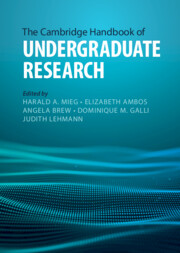Book contents
- The Cambridge Handbook of Undergraduate Research
- The Cambridge Handbook of Undergraduate Research
- Copyright page
- Contents
- Figures
- Tables
- Contributors
- Foreword
- Foreword
- 1 Introduction
- Part I Theory and Research on Undergraduate Research
- Part II Implementation, Approaches, Methods
- Part III Disciplines
- 17 Introduction
- Part III.1 STEM
- 18 Undergraduate Research in Physics
- 19 Undergraduate Research in Chemistry
- 20 Undergraduate Research in Biology
- 21 Undergraduate Research in Mathematics
- 22 Undergraduate Research in Engineering
- 23 Undergraduate Research in Data Science
- Part III.2 Health
- Part III.3 Social Sciences
- Part III.4 Humanities
- Part III.5 Arts & Design
- Part III.6 Disciplines A–Z
- Part IV International Perspective
- Part V Avenues for Developing Undergraduate Research
- Index
- References
18 - Undergraduate Research in Physics
from Part III.1 - STEM
Published online by Cambridge University Press: 11 August 2022
- The Cambridge Handbook of Undergraduate Research
- The Cambridge Handbook of Undergraduate Research
- Copyright page
- Contents
- Figures
- Tables
- Contributors
- Foreword
- Foreword
- 1 Introduction
- Part I Theory and Research on Undergraduate Research
- Part II Implementation, Approaches, Methods
- Part III Disciplines
- 17 Introduction
- Part III.1 STEM
- 18 Undergraduate Research in Physics
- 19 Undergraduate Research in Chemistry
- 20 Undergraduate Research in Biology
- 21 Undergraduate Research in Mathematics
- 22 Undergraduate Research in Engineering
- 23 Undergraduate Research in Data Science
- Part III.2 Health
- Part III.3 Social Sciences
- Part III.4 Humanities
- Part III.5 Arts & Design
- Part III.6 Disciplines A–Z
- Part IV International Perspective
- Part V Avenues for Developing Undergraduate Research
- Index
- References
Summary
Undergraduate research experiences have been identified as a high-impact practice in higher education.Within the physics community, research experiences were cited as a critical educational experience for undergraduate students by many thriving physics programs. Furthermore, the discipline has, for many years, supported undergraduate research experiences by advocating for and funding such programs as well as providing opportunities for undergraduate students to present their research at professional conferences and in peer-reviewed professional journals. In this chapter, the authors briefly highlight the benefits of research experiences to undergraduate physics students along with some of the known or community-accepted best practices for engaging undergraduate students in research. The authors also discuss the challenges faced by the community surrounding equity and our ability to engage all students in this meaningful professional and educational experience. While challenges exist, there are opportunities for the physics community to successfully address them through hard work, creativity, and innovation.
- Type
- Chapter
- Information
- The Cambridge Handbook of Undergraduate Research , pp. 191 - 198Publisher: Cambridge University PressPrint publication year: 2022



